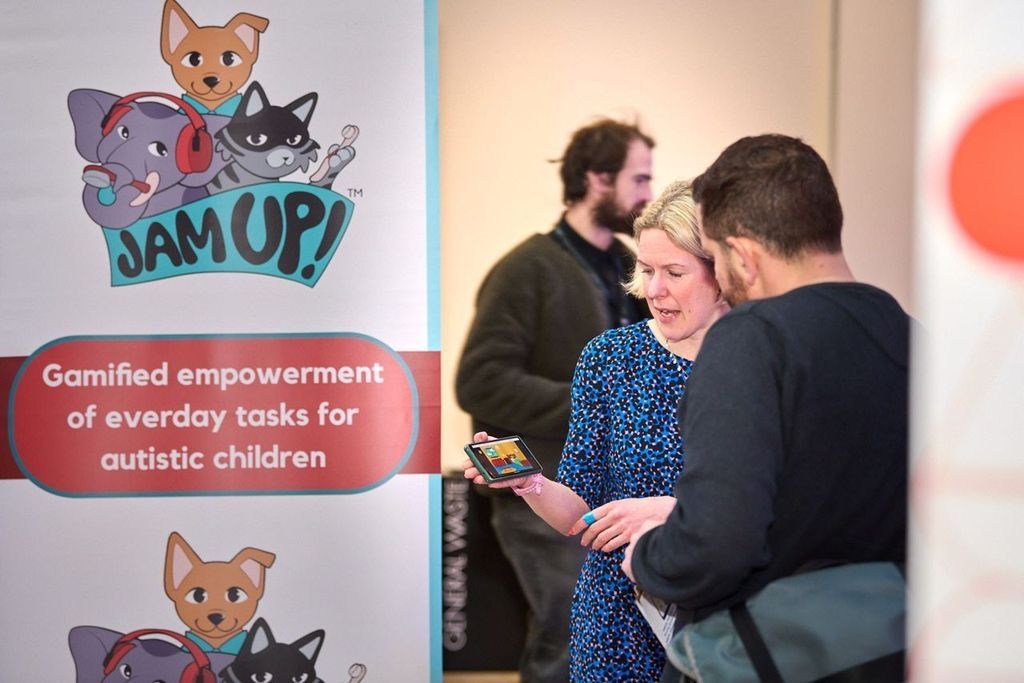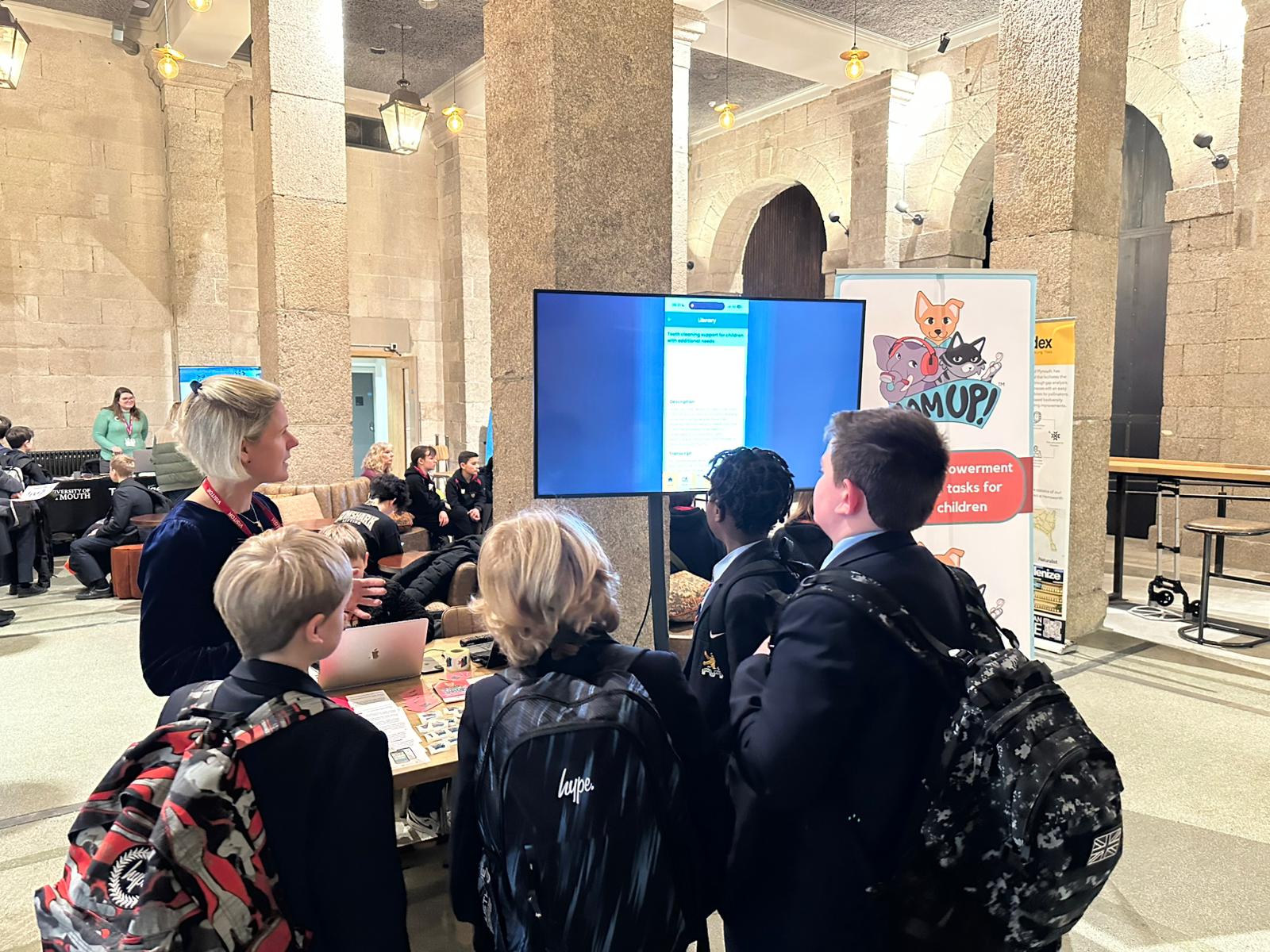Rachael Malthouse: Empowering autistic children through digital play
Rachael Malthouse exemplifies how an entrepreneurial mindset can help turn innovative research ideas into life-changing technologies
Our case study series features inspiring researchers discussing their careers and sharing tips on how they engage beyond academia. If you would like to be featured, send us an email at DBAA@exeter.ac.uk!

Rachael Malthouse, PhD student and entrepreneur
In this case study, we speak to PhD student and digital health entrepreneur Rachael Malthouse about how her occupational therapy research helped her to design an app to aid autistic children in their day-to-day tasks.
Rachael is a PhD student and Founder of Spectrum Tailored Technologies, a company which makes the app Jam Up!, designed to support autistic children to complete everyday tasks. While pursuing her research into occupational technology-focused research, Rachael applied her knowledge of health technology uptake and her experience as a physiotherapist to design an app which supports autistic children and their families.
Rachael’s work on Jam Up! was inspired by her own lived experience raising an autistic son, and the struggles he faces. The app combines advice and support for the parents and carers of autistic children with a fun, digital play-based approach to tasks for the children themselves.

Rachael's top tips for researchers interested in engaging beyond academia
- Don’t overcomplicate things: the simplest route is often the most effective.
- Always keep your audience in mind: it can be so easy to just start doing things because they’re exciting or because a grant leans that way, but make sure it’s relevant to your audience.
- Keep track of IP: if what you’re doing generates IP, make sure you work with your university to figure out who owns it.
Over the course of my career as a physiotherapist, I have had the opportunity to work in a range of different roles. Before starting my PhD, I lectured at the University of Plymouth on allied health profession modules and so had research contacts at the university.
My PhD is investigating how older people who live in supported housing use technologies in their everyday lives. As a result of this project, I’ve been able to see academic research in health technology become more and more relevant to healthcare, and to observe these health technologies in action. As part of my research, I spent five months at two different supported housing sites, observing people’s technology use, and conducting interviews about the barriers and facilitators around using different types of technology.
As I was doing this research, my autistic son was finding school harder and harder. So, during a pause while I was waiting for ethics approval for my PhD research, I decided to improve things for my son and children like him. I had an idea for a digital platform that could help my son get ready for school more easily and manage these everyday tasks. That idea would eventually become the app Jam Up!
“Jam Up! has helped me pull together different parts of my life – my PhD research, my professional career, and my experiences as a parent.”
Because I was in that university context, I was aware of the range of funding that was available. At the time, I was able to apply for funding from the eHealth Productivity and Innovation in Cornwall and the Isles of Scilly project, run out of the University of Plymouth. I received a grant of £10,000 from this fund to produce a prototype of Jam Up! We found that when we made a basic mock-up for my son, it really did work, and it helped him with those everyday tasks. It felt so exciting and rewarding to be able to put what I was learning through some aspects of my PhD into action. The app development was also feeding into my PhD research because I was learning so much more about creating technologies for people. At every stage since then, I’ve been telling myself “Well, I’ve already got this far, so I might as well keep going.”
The app itself works by breaking difficult tasks into component parts. Autistic children often find everyday tasks like getting dressed and cleaning their teeth to be uncomfortable, frustrating and overwhelming, because of their communication, physical or sensory needs. Obviously, these are tasks that you’re doing multiple times a day, every day, so that frustration and that discomfort can get really wearing. To try to make these things easier and more fun, Jam Up! gamifies these tasks. Kids get to choose and name a digital pet that helps them through the task by supporting them to plan out and sequence the actions and then prompts them to complete each step.
In addition to support for the children themselves, the app also includes resources and advice from healthcare professionals for the parents and carers of children. Sometimes people are left waiting for an Autism Spectrum Disorder assessment for years, so we give parents support for managing in the meantime with practical tips that they might not have thought of before.
Since that initial grant, we’ve had over £200,000 of grant money and competition wins. But we’re still always looking for investment, because part of the difficulty of being a startup is having to jump between different grants and different awards. Seeking investment involves pitching to investors It would be so much easier for us to be able to plan out and follow our road map if we knew we had investment whilst we scale. But in the meantime, we’re doing a little at a time and we do have an income stream now that we have launched and people have subscribe to Jam Up!. This approach has worked for us so far, and has taught us to be clever with how we’ve spent our money.
Now that we’ve launched, we have two routes to market. One of those is through individual families, who can pay for a subscription package for a pro-version of the app. The other is to get commissioned in local authority NHS services. This would mean that families currently on the waiting list for diagnosis can get immediate support. The implications for those families are huge; lots of parents and carers have to reduce or stop work because of caring responsibilities. Support with basic everyday tasks can make a huge difference. Digital solutions are a low-cost way of delivering support. They don’t work for everyone, but can be an effective, affordable solution.

"The users of Jam Up! are the reason we’re doing this, so we work hard to gather and implement their feedback."
We’re really keen to listen to what people want and, as the app has evolved, we have added content based on user feedback and requests.
PhD research and my work on Jam Up! fit well together. Since Jam Up! is a tech device, we need good research evidence to show that it’s effective. My own research on health technology at supported learning facilities has helped with that. It means I’ve got a clear sense of the barriers and facilitators to adoption of these types of solutions. With my lived experience as being a mother of an autistic child, I’ve also got the perspective from the other side. I think Jam Up! has helped me pull together different parts of my life – my PhD research, my professional career, and my experiences as a parent.
We’ve also been working with PhD students and student interns on smaller projects to form part of our evidence base. We’ve got a PhD student at the University of Essex starting with us later this year who will be working on assessing reliability and usability. We’ve also received support for another project at Anglia Ruskin University and have recently completed an augmented reality prototype project with the University of Plymouth. These research connections with universities are a great resource for startups. I feel so lucky to have had so much support from universities, since I’ve got other friends who haven’t got connections with universities, and it feels like I’ve had quite an advantage by being in that position.
“The opportunities keep rolling in – university collaborations and business opportunities just feed into one another.”
Something I have learnt is that you don’t have to be devoted to one university. We’re currently working with students from four different universities, we received our initial funding from the University of Plymouth, and we also won money from the University of Birmingham’s N-CODE neurological technologies pitching competition. We’re part of the University of Plymouth’s Entrepreneurial Futures project, which means we were able to work with the head of the Masters of Gaming programme for the game design elements. As a start-up, forging connections with different research communities across the country, has given us a huge advantage.
“As a start-up, forging connections with different research communities across the country, has given us a huge advantage.”
The opportunities keep rolling in – university collaborations and business opportunities just feed into one another.
The biggest challenge with doing this research while at a university, though, is the problem of IP. I was part of the iCure programme, which was brilliant, but meant that I could only do the first stage while retaining the IP myself. When starting Jam Up!, I was careful to reach an agreement with the university in which I owned the IP. Unfortunately, this means that I can’t do the higher levels of iCure, which would require the IP to be owned by the university.
We’ve also had some great support from industry bodies. We were part of Creative UK’s Cornwall Create Growth cohort two, as a gaming company. The programme offered us access to pitch practising, mentoring, networking and showcases. I met our Chief Technology Officer, as well as our animators and developers, through the mentorship scheme.
You can support Rachel by downloading Jam Up! from the app stores or via the website www.jamup.io. Reach out directly to Rachael if you are interested in partnering with Spectrum Tailored Technologies or gaining or internship experience.
Rachael Malthouse rachael.malthouse@jamup.io



















